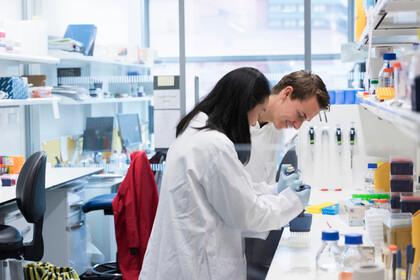
Major initiatives and directed funding
Tackling some of the biggest challenges in research requires a long-term perspective and a sizeable focus. We call this area of work our directed funding.
Our support and contributions to these initiatives are designed to give global researchers the freedom to ask bold questions and the tools, technologies and thriving research environments to make more serendipitous discoveries.
Major partnerships
These facilities enable research to happen at a scale or speed that was previously not possible.
They give researchers the cutting-edge technology needed to transform our understanding of health, life and wellbeing – from high throughput sequencing in genomics to the study of protein structures at sub-atomic resolution. This helps researchers make new discoveries, and can also reveal entirely new avenues of science for exploration.
Focused, core support brings together teams who use their expertise, knowledge and skills to advance ideas and help us achieve our mission. Working to a common goal while sharing the same physical space and facilities means researchers can collaborate to tackle some of the biggest questions in science.
We fund globally, investing in researchers, large programmes of research and co-funded initiatives both in the UK and in low- and middle-income countries. The latter plays a central role in our commitment to tackle health problems where the need is greatest and to work in partnership with those making a difference in their communities through research.
UK partnerships
Diamond Light Source is the UK’s national synchrotron. We partnered with the UK government, through the Science and Technology Facilities Council, to set up this ambitious project in 1998. It's the largest scientific facility in the UK and provides state-of-the-art facilities for life and physical sciences.
The Francis Crick Institute is a partnership between Wellcome, the Medical Research Council, Cancer Research UK, University College London, Imperial College London and King's College London. It is the largest biomedical research institute in Europe.
The Sainsbury Wellcome Centre is funded through a partnership between Wellcome and the Gatsby Foundation. The centre focuses on furthering our understanding of neural circuits in the brain.
The Wellcome Sanger Institute in Hinxton, Cambridgeshire was established in 1993 to collaborate on the Human Genome Project – the sequencing of the first human genome. We have continued to fund Sanger and it has grown into a world-leading institute in human genomics research.
Over the past 15 years, UK Biobank has collected data on the health and lifestyle of half a million people in the UK. It is the world’s most comprehensive source of health data used for research, including the largest-by-far whole genome sequence data set of its 500,000 participants. This invaluable resource is accessible to researchers worldwide to power scientific discoveries that improve human health.
Wellcome is working with the UK government to create a new Health Data Research Service that will help researchers make discoveries to improve health. The service will simplify secure access to UK health data for research.
Major partnerships beyond the UK
Discovery Research Platforms
The Discovery Research Platforms bring together researchers, teams and collaborators to address a range of practical, technological and methodological barriers that are holding up progress in different research fields.
This platform aims to address conceptual and technical barriers to improve understanding of how changes in the molecular networks surrounding cells leads to tissue decline. This has the potential to positively impact chronic diseases including cancer and fibrosis.
This platform will empower humanities and social science researchers, experts by experience, and health, creative and voluntary sector professionals to co-develop new and experimental approaches to tackling health challenges, including mental health and health inequalities.
This platform aims to take on gaps in our knowledge that hold back understanding of the interaction between infection and non-communicable diseases, and strengthen capacity to enable locally led, high-quality research.
This platform plans to develop new concepts, methods and tools that address issues of conflicting values in society, including real-time digital mapping of value disagreements and facilitating engagement with excluded voices and problems.
This platform will create a unique facility with transformative imaging technology, novel experimental designs and innovative analytics, all dedicated to studying how the human brain engages with the real world. It aims to provide new perspectives on the diagnosis and treatment of neurological and mental health conditions.
This platform aims to address practical barriers preventing data integration across metabolic and endocrine science. It will investigate how hormones control metabolic processes and how these can go wrong in disorders such as obesity, diabetes and cachexia, and create tools to facilitate global access to this data.
This platform seeks to move stem cell biology to the tissue and organ scale of research, creating a new network of local and international researchers to enable strategies that capitalise on new in vitro models to develop better treatments for human patients.
This platform plans to develop new tools to discover and characterise understudied proteins, visualise protein assemblies within cells and record rare cellular events, potentially opening new avenues for research into uncharacterised diseases and drug resistance.
Research centres and institutes
We invest in research centres and institutes to support researchers to work and train in world-class research environments. Working to a common goal while sharing the same physical space and facilities means researchers can collaborate to tackle some of the biggest questions in science.
European Molecular Biology Laboratory's European Bioinformatics Institute helps scientists realise the potential of big data in biology, exploiting complex information to make discoveries that benefit humankind.
The Wellcome Centre for Anti-Infectives Research is working to accelerate the discovery and investigation of new small-molecule candidates for treating neglected tropical diseases – initially focusing on visceral leishmaniasis and Chagas' disease.
The Wellcome Centre of Cultures and Environments of Health explores, creates and supports cultures and environments that promote health and wellbeing throughout people’s lives, drawing on expertise from the humanities, social and biomedical sciences.
The Wellcome Centre for Ethics and Humanities is rethinking bioethics to recognise the importance of data, genomics, neuroscience, and global interconnectivity. This will better equip bioethics to analyse the major moral problems in 21st-century bioscience and healthcare.
The Wellcome Centre for Human Genetics investigates the genetic causes and functional consequences of human disease, drawing on human and pathogen genomics and structural biology.
The Wellcome Centre for Integrative Neuroimaging is helping laboratory neuroscience to better benefit patients by making it easier to integrate neuroimaging across species and scales. It will generate new imaging markers for prediction, stratification and therapeutic monitoring, and make all data, analysis and related tools openly available.
The Wellcome Centre for Integrative Parasitology investigates molecular processes and pathways in parasites in order to develop new approaches to treatment. It uses techniques from genomics and molecular epidemiology to study parasites and their interactions with host immune systems.
The Wellcome Centre for Mitochondrial Research carries out basic and clinical research on genetic and cell-biological mechanisms of mitochondrial disease, phenotypes patients, and develops new approaches to prevention and treatment.
The Wellcome / CRUK Gurdon Institute aims to understand the fundamental mechanisms of normal biological development, look for where these mechanisms fail in cancer and other diseases of ageing and, where possible, to develop new therapies. It is funded in partnership with Cancer Research UK (CRUK).
The Wellcome / EPSRC Centre for Interventional and Surgical Sciences is advancing image-guided surgery by combining imaging, sensing and smart instruments. It helps clinicians to adopt these new technologies and methods and to interact with patients and the general public.
The Wellcome / EPSRC Centre for Medical Engineering is developing markers to allow early detection of disease so that its onset or progression can be prevented. It will focus on cardiovascular, oncological and neurological applications of medical imaging (primarily MRI and PET). It is jointly funded with the Engineering and Physical Sciences Research Council and King’s College London.
The MRC Cambridge Stem Cell Institute investigates the mechanisms regulating stem and progenitor cells, both normal and pathological, for the prevention and treatment of disease. It is funded in partnership with the Medical Research Council (MRC).
What funding opportunities are available?
We have several grants and awards available to researchers at all stages of their career.

